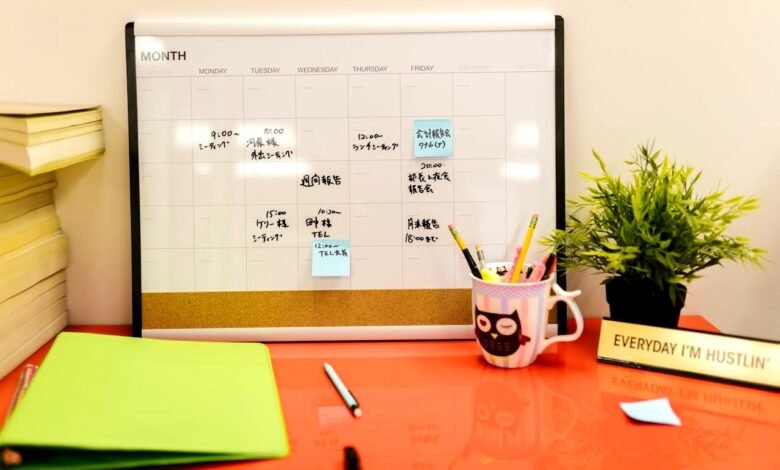How to Create the Perfect Study Schedule for Finals
Discover step-by-step strategies to create the perfect study schedule for finals. Reduce stress, and ace your exams with this detailed guide.

Final exams can be a daunting time for students. With multiple subjects to review, projects to complete, and deadlines looming, it’s easy to feel overwhelmed. However, with the perfect study schedule for finals, you can maximize productivity, retain more information, and reduce last-minute cramming. In this comprehensive guide, we’ll walk you through everything you need to create and stick to a study schedule that works.
Why You Need a Study Schedule for Finals
Creating a study schedule isn’t just about time management—it’s about smart learning. A well-structured plan enables you to allocate sufficient time for each subject, prioritize difficult topics, and include necessary breaks. The perfect study schedule for finals is a strategic tool that enhances focus, prevents burnout, and boosts academic performance.
Step 1: Assess Your Current Situation
Before diving into planning, take stock of your current academic landscape. Make a list of all your finals, including their dates, formats (multiple choice, essay, open-book), and weight in your final grade. Identify your strongest and weakest subjects.
Actionable Tip:
Use a calendar or planner to visually organize exam dates. This visual overview helps in backward planning, ensuring you have ample time for each subject.
Step 2: Set Clear, Achievable Goals
Without goals, your study schedule might lack direction. Decide what you aim to achieve with each study session. Do you want to master a concept, complete a past paper, or revise a chapter?
SMART Goals for Studying:
- Specific: Focus on a particular chapter or topic.
- Measurable: Track your progress using quizzes or summaries.
- Achievable: Set realistic expectations based on your time and abilities.
- Relevant: Align with the syllabus and exam format.
- Time-bound: Limit study sessions to 45-90 minutes with breaks.
Step 3: Understand Your Learning Style
Knowing your learning style is crucial for creating the perfect study schedule for finals. Are you a visual learner who benefits from diagrams? Or do you prefer auditory input through lectures and podcasts?
Learning Style Strategies:
- Visual: Use charts, flashcards, and mind maps.
- Auditory: Record your notes and listen to them.
- Reading/Writing: Take detailed notes, summarize chapters.
- Kinesthetic: Use hands-on activities like teaching others.
Step 4: Prioritize Subjects and Topics
Not all subjects require equal attention. Allocate more time to subjects you struggle with or those that carry more weight in your final grade.
Priority Matrix:
- High Priority: Difficult subjects, upcoming exams
- Medium Priority: Subjects you understand but need reviewing
- Low Priority: Subjects you’re confident in
Create a color-coded calendar for quick visual cues on where to focus each day.
Step 5: Design Your Ideal Daily Routine
Consistency is key in the perfect study schedule for finals. Create a daily routine that includes study blocks, breaks, meals, and leisure time.
Sample Study Day:
- 8:00 AM – Wake up & breakfast
- 9:00 AM – 11:00 AM – Study Session 1 (Subject A)
- 11:00 AM – 11:30 AM – Break
- 11:30 AM – 1:30 PM – Study Session 2 (Subject B)
- 1:30 PM – 2:30 PM – Lunch
- 2:30 PM – 4:00 PM – Practice Tests/Review
- 4:00 PM – 5:00 PM – Break/Exercise
- 5:00 PM – 6:30 PM – Light Review/Flashcards
- 7:00 PM onwards – Dinner & Relaxation
Step 6: Use Time Management Techniques
Integrate proven time management strategies into your routine to stay productive.
Effective Techniques:
- Pomodoro Technique: Study for 25 minutes, break for 5.
- Time Blocking: Allocate fixed hours to specific tasks.
- Eisenhower Matrix: Focus on tasks that are both urgent and important.
These methods help you stay on track and prevent procrastination.
Step 7: Incorporate Active Recall and Spaced Repetition
Passive reading isn’t enough. To ensure retention, your perfect study schedule for finals must include active recall and spaced repetition.
How To Do It:
- Quiz yourself after each study session.
- Use apps like Anki or Quizlet.
- Revisit material at increasing intervals (1 day, 3 days, 7 days).
Step 8: Schedule Breaks and Downtime
Avoid burnout by including breaks in your schedule. Short, frequent breaks refresh the mind and improve focus.
Break Ideas:
- 10-minute walks
- Stretching or light exercise
- Listening to music
- Talking to a friend
Include at least one full day off per week to recharge.
Step 9: Stay Flexible and Adjust as Needed
The perfect study schedule for finals is not set in stone. Life happens—you might get sick, need extra time on a topic, or just have an off day. Build buffer time into your schedule for such events.
Tips for Flexibility:
- Review your schedule weekly
- Be honest about what’s working
- Shift tasks as needed without guilt
Step 10: Track Progress and Celebrate Milestones
Motivation increases when you see progress. Use a checklist, planner, or app to track your study goals.
Reward System:
- Small treats for daily goals (e.g., favorite snack)
- Bigger rewards for weekly milestones (e.g., movie night)
- Celebrate the end of finals with something special
Tools and Resources to Help You Succeed
Enhance your study schedule with tools like:
- Digital Planners: Google Calendar, Notion
- Note Apps: Evernote, OneNote
- Study Aids: Khan Academy, Coursera, YouTube channels
- Productivity Apps: Forest, Focus Booster
Common Mistakes to Avoid
Creating the perfect study schedule for finals is only effective if executed well. Avoid these pitfalls:
- Overloading your schedule
- Ignoring breaks
- Cramming the night before
- Sticking rigidly to a failing plan
Instead, aim for a balance between structure and adaptability.
Final Thoughts
Creating the perfect study schedule for finals takes effort, self-awareness, and a bit of trial and error. By assessing your situation, setting goals, leveraging learning styles, and using strategic time management techniques, you can create a schedule that leads to academic success. Remember to stay flexible, track your progress, and take care of your mental health along the way.
Start now, and give yourself the best chance to excel this finals season.











